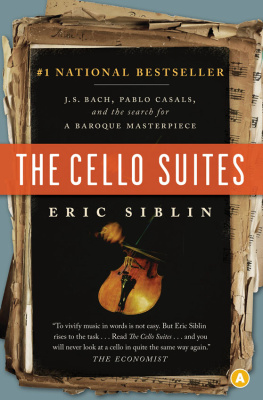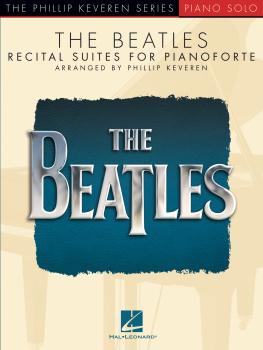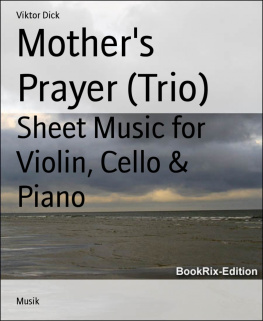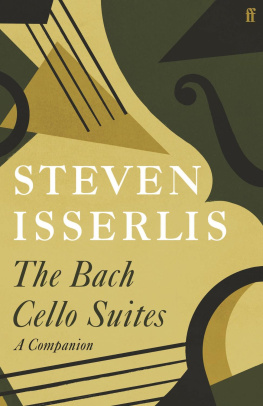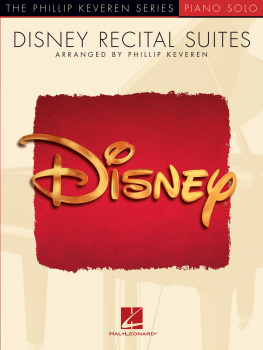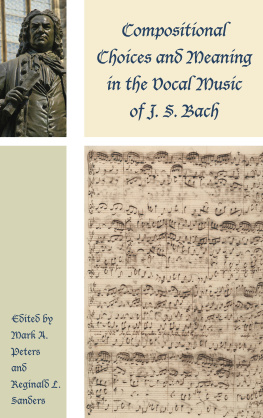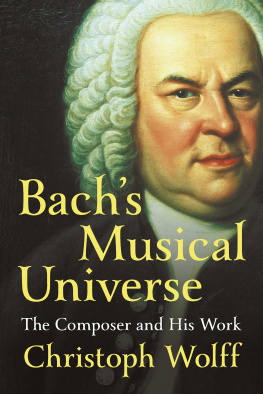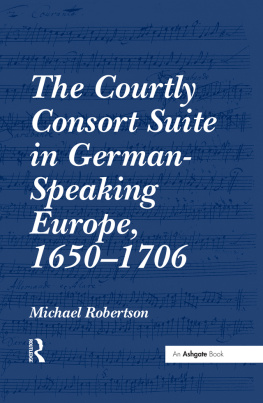PRAISE FOR ERIC SIBLIN AND THE CELLO SUITES
This is one of the most extraordinary, clever, beautiful, and impeccably researched books I have read in years. A fascinating story deftly told and, for me at least, ideally read with Bachs thirty-six movements playing softly in the background: a recipe for literary rapture. Simon Winchester, author of theNew York TimesbestsellerThe Professor and the Madman
Its not often that one begins reading a book with mild interest and then cant put it down, which happened to me with this beautiful book. Diana Athill, author ofStetandSomewhere Towards the End
... pitch-perfect...The Cello Suitesis, on all counts, a superior book. QWF McAuslan First Book Prize Jury Citation
... an ambitious, carefully researched, and inventively constructed book written with clarity and verve. Mavis Gallant Prize for Nonfiction Jury Citation
A delightfully quirky quest... Eric Siblin seamlessly weaves together the tale of how Bachs lost and mostly forgotten manuscript came to be discovered a century later by Pablo Casals, and finally became Siblins personal passion. Governor Generals Literary Award Jury Citation
A book of extraordinary charm, insight, and widespread literary appeal. BC National Award for Canadian Nonfiction Jury Citation
... a work of ever-percolating interest... entertaining... [a] tirelessly enthusiastic effort. New York Times
... a delightful whirlwind tour through two different ages of musical history... As Siblin inevitably concludes, Every age reimagines Bach on its own terms. Were lucky that we have a writer this skillful and creative to do the work. The Walrus
Conveying in mere words sounds as rich and multifarious as those that comprise the Cello Suites takes no small literary gift. To say the author has done justice to his subject is the highest praise of all. Montreal Gazette
To vivify music in words is not easy. But Mr. Siblin rises to the task... ReadThe Cello Suites preferably with their melodious hum in the background and you will never look at a cello in quite the same way again. The Economist
A passionate ode to the joy of discovery... genuine and well researched... with prose of cinematic quality... What a gift. The Times
[A] winding, entertaining tale... Siblin is an insightful writer with an ability to convey the sound and emotional impact of music in words. Publishers Weekly
Art is a never-ending process of re-creation and re-imagination. Eric Siblins first contact, seduction, and eventual obsession is a beautiful example of that process, artfully retold. Toronto Star
The quest was part Homer but also part George Plimpton... The way the doors opened onto other doors in this quest makes Alices seem one-dimensional by comparison... This book shouts life and also a future for our music. Queens Quarterly
Insightful [and] engaging... Eric Siblin puts us in touch with the joy of discovering a new passion in life. John Terauds,Toronto Star
Siblins curiosity and passion for his subject is evident throughout, and his method of structuring the story according to the arrangement of the music is inspired... If Siblin is correct that Bach is what you make of him, thenThe Cello Suiteshas made [Bach], if possible, yet more legendary. Quill & Quire
Copyright 2009 Eric Siblin
All rights reserved. No part of this publication may be reproduced or transmitted in any form or by any means, electronic or mechanical, including photocopying, recording, or any information storage and retrieval system, without permission in writing from the publisher.
Distribution of this electronic edition via the Internet or any other means without the permission of the publisher is illegal. Please do not participate in electronic piracy of copyrighted material; purchase only authorized electronic editions. We appreciate your support of the authors rights.
This edition published in 2010 by
House of Anansi Press Inc.
110 Spadina Avenue, Suite 801
Toronto, ON, M5V 2K4
Tel. 416-363-4343
Fax 416-363-1017
www.anansi.ca
LIBRARY AND ARCHIVES CANADA CATALOGUING IN PUBLICATION DATA
Siblin, Eric, 1960
The cello suites : J. S. Bach, Pablo Casals, and the search for a
Baroque masterpiece / Eric Siblin.
eISBN 978-0-88784-879-7
1. Bach, Johann Sebastian, 16851750. Suites, violoncello, BWV 10071012.
2. Casals, Pablo, 18761973. 3. Siblin, Eric, 1960. I. Title. II. Title: J. S. Bach, Pablo Casals, and the search for a Baroque masterpiece.
ML410.B1S564 2009 787.41858092 C2008-906428-3
Jacket Design: Ingrid Paulson

We acknowledge for their financial support of our publishing program the Canada Council for the Arts, the Ontario Arts Council, and the Government of Canada through the Canada Book Fund.
To my parents, Herbert and Jacqueline Siblin
SUITE NO. 1
G major
PRELUDE
We find a world of emotions and ideas created with only the simplest of materials.
LAURENCE LESSER
T HE FIRST MEASURES unfold with the storytelling power of a master improviser. A journey has begun, but its as if composition is taking place on the spot. The deep-toned strings take us back to the 1700s. The soundworld is happy. The jauntiness youthful. Discovery is in the air.
After a pause that contemplates the future, the cello resumes with aching soulfulness. Things will not come easily. The notes are murmured, stated with courtly purpose, and blasted through with rapture. We peak higher. A new vista opens up, rhapsodic resolution, the descent a soft landing.
This is how the opening notes of Bachs Cello Suites sounded to me as I sat in the courtyard of a seaside villa in Spain that once belonged to Pablo Casals, the Catalan cellist who discovered the music as a boy one afternoon in 1890. As I listened to the music on headphones, shaded by the palms and pines of a lush garden, the shimmering waves of the nearby Mediterranean seemed to roll perfectly in time with the prelude of the first cello suite.
There was no more fitting place to appreciate the music. Although the Cello Suites first flowed from the composers quill sometime in the early 1700s, it was Casals who, two centuries later, made them famous.
My own discovery of the Cello Suites had taken place one autumn evening in 2000, a Bach Year marking two and a half centuries since the death of the composer. I was in the audience at Torontos Royal Conservatory of Music to hear a cellist Id never heard of play music I knew nothing about.
I had no reason to be there aside from a concert listing in a local newspaper, idle curiosity, and the fact that I was staying at a nearby hotel. But I might have been searching for something without knowing it. Sometime earlier I had ended a stint as pop music critic for a daily newspaper in Montreal, The Gazette, a job that had filled my head with vast amounts of music, much of which I didnt want to be there. The Top 40 tunes had over-stayed their welcome in my auditory cortex, and the culture surrounding rock music had worn thin. I still wanted music to occupy a central place in my life, but in a different way. The Cello Suites, as it turned out, offered a way out of the jam.
The program notes for the recital by Laurence Lesser, a distinguished cellist from Boston, explained that amazingly, for a long time, the Cello Suites were seen as only a collection of exercises. But since Casals had started playing the suites at the dawn of the twentieth century, we now know how lucky we are to possess these extraordinary masterworks. What most music-lovers dont know, however, is that no known composers manuscript of these works exists... There exists no truly reliable source for the suites. This got the journalistic wheels in my head turning: what had happened to Bachs manuscript?


